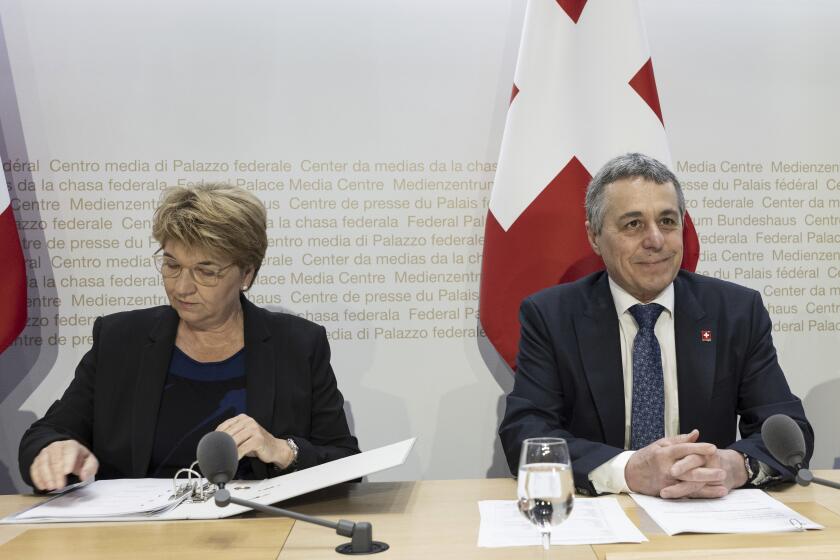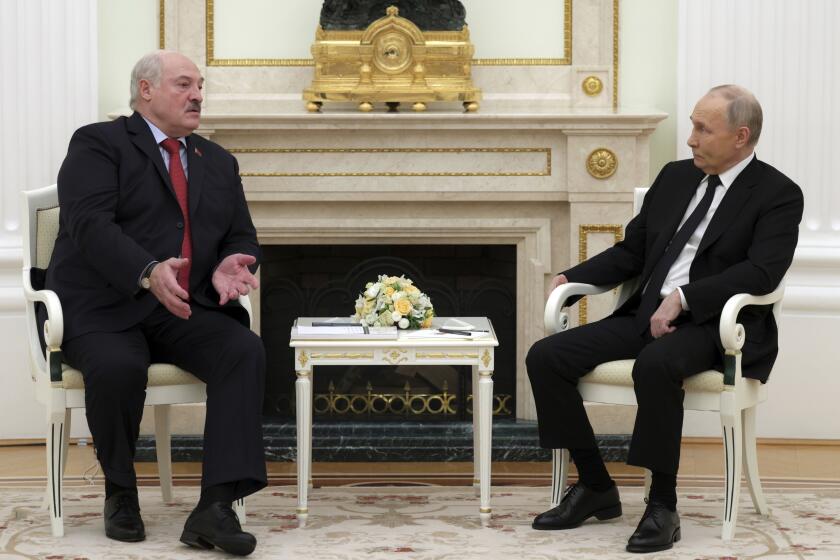Nearly 80 countries at Swiss summit agree Ukraine’s ‘territorial integrity’ is key to peace

- Share via
OBBUERGEN, Switzerland — Seventy-eight countries jointly called Sunday for the “territorial integrity” of Ukraine to be the basis for any peace agreement to end Russia’s two-year war, though some key developing nations at a Swiss conference did not join in.
The joint communique capped a two-day conference at the Buergenstock resort in Switzerland marked by the absence of Russia, which was not invited, but that many attendees hoped could join in on a roadmap to peace some time in the future.
The all-out war since President Vladimir Putin’s invasion of Ukraine in February 2022 has killed or injured hundreds of thousands of people, unsettled world markets for goods such as grain and fertilizer, driven millions from their homes and carved a wedge between the West — which has sanctioned Moscow over the war — and Russia, China and some other countries.
About 100 delegations, mostly Western countries but also some key developing nations, were on hand for the conference that was billed as a first step toward peace at a time when the warring countries are seemingly as far apart as ever.
Switzerland’s president says nearly 90 countries and organizations, half from Europe, have confirmed attending the Swiss-hosted Ukraine peace summit.
The event included presidents and prime ministers from France, Germany, Britain, Japan, Poland, Argentina, Ecuador, Kenya and Somalia.
India, Mexico, Saudi Arabia, South Africa, Thailand and the United Arab Emirates — which were represented by foreign ministers or lower-level envoys — were among those that did not sign the final document, which focused on issues of nuclear safety, food security and the exchange of prisoners.
Brazil, an “observer” country, did not sign on but Turkey — which has at times sought to act as an intermediary between Russia and Ukraine — did.
The final document said the United Nations Charter and “respect for territorial integrity and sovereignty … can and will serve as a basis for achieving a comprehensive, just and lasting peace in Ukraine.”
Viola Amherd, the Swiss president who hosted the event, told the final news conference the “great majority” of participants agreed to the final document, which “shows what diplomacy can achieve.”
Dozens of world leaders meet in Switzerland to discuss how to bring peace to war-ravaged Ukraine, though hopes are muted by Russia’s absence.
Ukrainian President Volodymyr Zelensky hailed the “first steps toward peace” at the meeting, and said the joint communique remains “open for accession by everyone who respects the U.N. Charter.”
Testifying to both war fatigue and other preoccupations that have emerged in recent months, only about half of U.N. member countries took part. In March 2022, condemnation of Russia’s invasion led to passage of a nonbinding resolution at the U.N. General Assembly by 141 countries calling for a halt to Moscow’s use of force and pullout of Russian troops.
In Switzerland, the challenge was to talk tough about Russia, but also open the door for it to join a peace initiative.
“Many countries ... wanted the involvement of representatives of the Russian Federation,” Zelensky told a final news conference. “At the same time, the majority of the countries do not want to shake hands with them [Russian leaders] ... so there are various opinions in the world.”
Ursula von der Leyen, the president of the European Union’s executive Commission, said the conference was rightly titled “Path to Peace” because peace won’t be achieved in a single step.
Russian leader Vladimir Putin has mocked a planned round of Ukraine peace talks in Switzerland, warning that Moscow will not accept enforced agreements.
“It was not a peace negotiation because Putin is not serious about ending the war. He is insisting on capitulation. He is insisting on ceding Ukrainian territory — even territory that today is not occupied by him,” she said. “He is insisting on disarming Ukraine, leaving it vulnerable to future aggression. No country would ever accept these outrageous terms.”
Analysts maintained the conference would have little concrete effect toward ending the war because Russia was not invited. China, which did not attend, and Brazil have jointly sought alternative routes toward peace.
The themes of nuclear safety, food security and prisoner exchanges featured in the final statement. Italian Prime Minister Giorgia Meloni said they amounted to “minimum conditions” for negotiations with Russia, alluding to how many other areas of disagreement between Kyiv and Moscow will be harder to overcome.
Qatar’s prime minister, Sheikh Mohammed bin Abdulrahman al Thani, said Saturday that his rich gulf country hosted talks with both Ukrainian and Russian delegations on the reunification of Ukrainian children with their families that have so far resulted in 34 children being reunited.
Russian President Vladimir Putin proposed a cease-fire if Ukraine withdraws troops from Russian-claimed areas and gives up its NATO bid. Kviv calls offer a ‘sham.’
The Ukrainian government believes that 19,546 children have been deported or forcibly displaced, and Russian Children’s Rights Commissioner Maria Lvova-Belova has previously confirmed that at least 2,000 were taken from Ukrainian orphanages.
Montenegro Prime Minister Milojko Spajic told the gathering Sunday: “As a father of three, I’m deeply concerned by thousands of Ukrainian kids forcibly transferred to Russia or Russia-occupied territories of Ukraine.”
“We all at this table need to do more so that children of Ukraine are back in Ukraine,” he added.
In Kyiv, at a regular demonstration by relatives of soldiers captured by Russia, the response to the Swiss gathering was muted.
“I would really like to believe that this [conference] will have an impact, but some very important countries did not sign the communique,” said Yana Shyrokyh, 56, whose army serviceman son has been in captivity since 2022. “I would really like them to find powerful levers of influence on Russia.”
Keaten writes for the Associated Press. AP journalists Derek Gatopoulos and Dmytro Zhyhinas in Kyiv, Ukraine, contributed to this report.
More to Read
Sign up for Essential California
The most important California stories and recommendations in your inbox every morning.
You may occasionally receive promotional content from the Los Angeles Times.














